The 13 Clocks
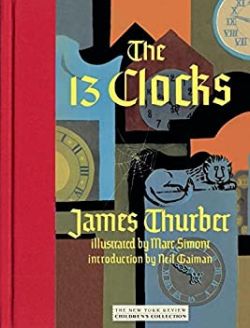
James Thurber
Recommender: Lee Miller
This short children’s novel is pure pleasure, and not of the guilty sort, given its author’s literary bona fides. Thurber’s prose borders on poetry, and his love of the beauty and weirdness of the English language is infectious. The original illustrations by Marc Simont are enticing, evocative, and leave just the right amount to the imagination.
The story is both classic and strange, both dark and playful, and deviously comic throughout. The evil Duke is a villain among the best, and he invites the reader to partake in his sinister glee (while rooting for his downfall).
The book, and its Duke, can be jauntily grotesque. As one off-put parent reviewing this book online had to say, “Eye got put by a bird?! Killed [by] sword and fed to geese? These are pretty gross…”
No wonder I loved this so much as a kid! Now, as a parent, I’ve had the pleasure to read it to my own children, and no book has ever been so much fun to read aloud.
Things to Make and Do in the Fourth Dimension: A Mathematician’s Journey Through Narcissistic Numbers, Optimal Dating Algorithms, at Least Two Kinds of Infinity, and More
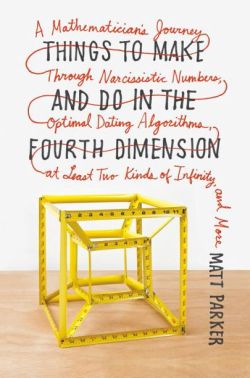
Matt Parker
Recommender: Chelsea Greene
If you are looking for a HILARIOUS read: Look no further! If you are looking for a hilarious read and would be interested in expanding your math knowledge: Oh my goodness please go read this book.
Matt Parker takes you on a grand tour of math concepts big and small (as you can see from the title). His unique view on the topic is both entertaining and energizing and I could not put the book down.
Along the way you will also gather a plethora of fun facts and puzzles. Some so fun that I am have to actively restrain myself from adding them to this review.
Wolf Hall

Hilary Mantel
Recommender: Sebastian von Zerneck
Set in the early 16th century, this historical novel covers Thomas Cromwell’s rise to power in the court of Henry VIII. Mantel did five years of deep historical reach on the period, so the attention to detail and realism are super, but it’s also a gripping thriller in its own right.
Invisible Man
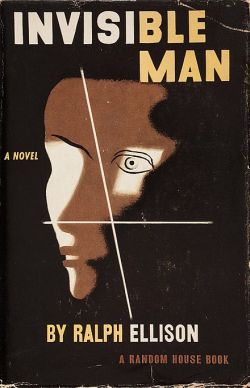
Ralph Ellison
Recommender: Chris Dunlap
Rarely assigned (at least back when I was in high school), Ralph Ellison’s Invisible Man traces the life story of a fictional Black man in a society where people “refuse to see him.” Written when the author was only 33, Invisible Man has won every literary award under the sun and guaranteed literary immortality for Ellison. More importantly for our students, as a 17- or 18-year-old white suburban kid reading it, it illustrated to me in visceral and immediate terms the kind of structural racism that tens of millions of Americans still face daily. Truly great literature that never, ever feels like a slog―and I guarantee you’ll remember the last line for the rest of your life!
Travels with Herodotus
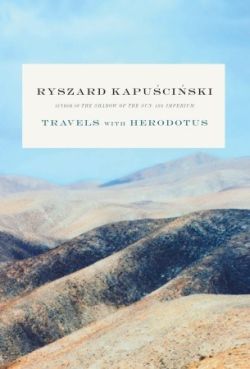
Ryszard Kapuscinski
Recommender: Chris Dunlap
Travels with Herodotus is simply an astonishing book. Kapuscinski was a Polish foreign correspondent who ventured beyond the Cold War’s Iron Curtain to the rest of the world’s inhabited continents. Kapuscinski was inspired by the ancient Greek historian Herodotus’s accounts of the same lands (now countries) that he himself was visiting and living in the twentieth century, and his natural curiosity about the world and its diverse people leaps off of every page. Students will appreciate the link, I think, between ancient history and a more recognizable historical time of the 1950s-1980s that drives Kapuscinski’s book. Especially wonderful and nourishing for the soul after the global pandemic of COVID-19 and all the trips we couldn’t make.
Democracy in America
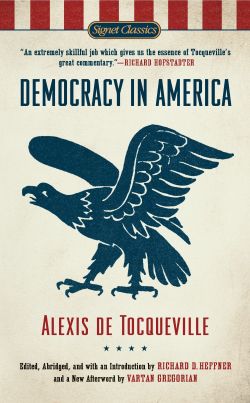
Alexis de Tocqueville
Recommender: Sebastian von Zerneck
In the 1830’s, Alexis de Tocqueville was sent by the French government to study the American prison system, but he used this as a pretext to study the broader American culture and political system. His learned outsider perspective provides a clear view of the democratic project, which he saw as the inevitable future form of government that would replace the ancien regime he knew so well in France. While de Tocqueville praises many parts of the American system, there are also critical undertones to his descriptions. He offers some predictions about the future of American democracy―how well do they hold up?

